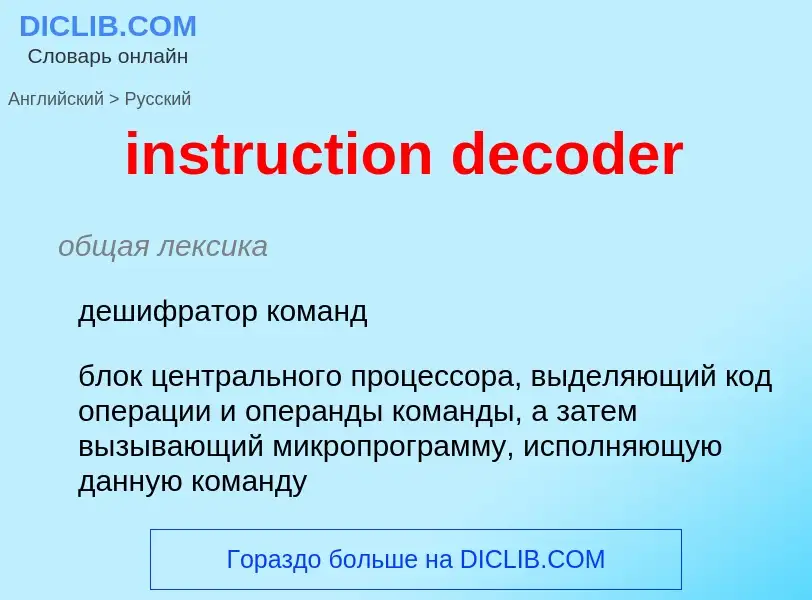ترجمة وتحليل الكلمات عن طريق الذكاء الاصطناعي ChatGPT
في هذه الصفحة يمكنك الحصول على تحليل مفصل لكلمة أو عبارة باستخدام أفضل تقنيات الذكاء الاصطناعي المتوفرة اليوم:
- كيف يتم استخدام الكلمة في اللغة
- تردد الكلمة
- ما إذا كانت الكلمة تستخدم في كثير من الأحيان في اللغة المنطوقة أو المكتوبة
- خيارات الترجمة إلى الروسية أو الإسبانية، على التوالي
- أمثلة على استخدام الكلمة (عدة عبارات مع الترجمة)
- أصل الكلمة
instruction decoder - ترجمة إلى إنجليزي
общая лексика
дешифратор команд
блок центрального процессора, выделяющий код операции и операнды команды, а затем вызывающий микропрограмму, исполняющую данную команду
Смотрите также
общая лексика
код команды
تعريف
ويكيبيديا

A central processing unit (CPU), also called a central processor or main processor, is the most important processor in a given computer. Its electronic circuitry executes instructions of a computer program, such as arithmetic, logic, controlling, and input/output (I/O) operations. This role contrasts with that of external components, such as main memory and I/O circuitry, and specialized coprocessors such as graphics processing units (GPUs).
The form, design, and implementation of CPUs have changed over time, but their fundamental operation remains almost unchanged. Principal components of a CPU include the arithmetic–logic unit (ALU) that performs arithmetic and logic operations, processor registers that supply operands to the ALU and store the results of ALU operations, and a control unit that orchestrates the fetching (from memory), decoding and execution (of instructions) by directing the coordinated operations of the ALU, registers and other components.
Most modern CPUs are implemented on integrated circuit (IC) microprocessors, with one or more CPUs on a single IC chip. Microprocessor chips with multiple CPUs are multi-core processors. The individual physical CPUs, processor cores, can also be multithreaded to create additional virtual or logical CPUs.
An IC that contains a CPU may also contain memory, peripheral interfaces, and other components of a computer; such integrated devices are variously called microcontrollers or systems on a chip (SoC).
Array processors or vector processors have multiple processors that operate in parallel, with no unit considered central. Virtual CPUs are an abstraction of dynamical aggregated computational resources.



![[[EDVAC]], one of the first stored-program computers [[EDVAC]], one of the first stored-program computers](https://commons.wikimedia.org/wiki/Special:FilePath/Edvac.jpg?width=200)




![core memory]] and [[external bus]] interface of a DEC [[PDP-8]]/I, made of medium-scale integrated circuits core memory]] and [[external bus]] interface of a DEC [[PDP-8]]/I, made of medium-scale integrated circuits](https://commons.wikimedia.org/wiki/Special:FilePath/PDP-8i cpu.jpg?width=200)
